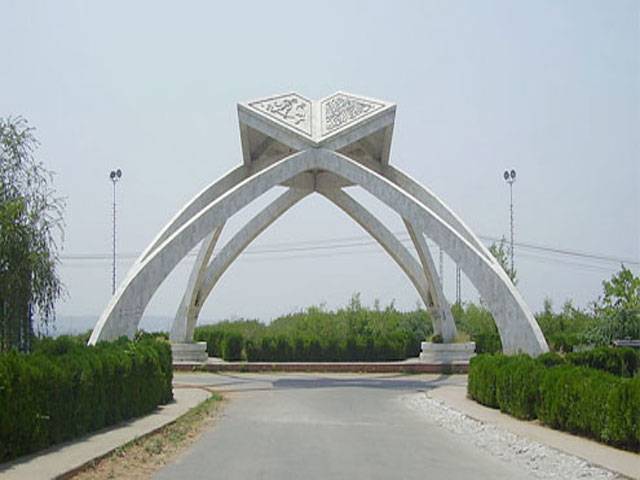ISLAMABAD – The School of Politics and International Relations (SPIR), Quaid-i-Azam University Islamabad, held a conference to celebrate the 50th anniversary of the Elysee Treaty between France and Germany. This Treaty reaffirms the post-World War II commitment of European states to minimize war and move towards diplomatic cooperation and peace building.
QAU Vice Chancellor Prof. Dr. Masoom Yasinzai, in his opening remarks emphasised the importance to commemorate the 50 years of French-German Elysee (E-Lai-C) Treaty of 22 January 1963 due to its historical significance. He said that it was an achievement in both nations history because it transformed the centuries old enmity into long lasting friendship.
“We at the Quaid-i-Azam University, as academics, appreciate the contribution of Western political thinkers including Max Weber and Immanuel Kant especially the notion of ‘Perpetual Peace’ by Kant.” As Elysee treaty created and developed the culture of diplomatic ties and use of ‘negotiation ‘and ‘peaceful means’ for the resolution of disputes.
The Vice Chancellor accentuated that in South Asia this example can serve as an inspiration for states like India and Pakistan, which share a similar history of conflict as the 19th and 20th century European states shared. In his opinion, “In South Asia, the Elysee Treaty entailing German-French cooperation, which paved the way to European integration as a whole, provides us a realistic paradigm to improve bilateral relations between India and Pakistan. Neither Islamabad nor New Delhi can afford the escalation of border skirmishes into all-out war. India and Pakistan need to learn from the beneficial effect of the Elysee Treaty and sincerely work to avoid safe the region from nuclear Armageddon. We are thankful that in today lectures we will benefit in understanding conflict and finding a ways to maintain peaceful relations among neighbors.”
In his speech Ambassador of France Philippe Thiebaud educated the audience about the main objective of the treaty as “a clear political commitment” with the identification of main fields of co-operation between two countries such as foreign affairs, defence, education and youth. Ambassador said, “Bilateral defence cooperation remains essential for France’s and Germany’s strategic objectives. He believed that “the Elysée Treaty remains the cornerstone of cooperation between our two countries, which is the main engine of the European Union; the two countries represent 33 percent of the EU population, 36 percent of the European Budget, 37 percent of the EU GDP, 31 percent of the voting rights. In the past few months, the two states have been working together, along with the other European countries to overcome the Eurozone crisis.”
Similarly, Ambassador of Germany Dr. Cyrill Nunn gave considerable importance to the Elysee Treaty as a catalyst in the positive transformation in Franco-German relations, which also contributed to the foundation of European Union. In his address, he mentioned that the regional integration not only lessens the probability of war between neighbours, but also increases cooperation, mutual understanding and boosts close cooperation entailing peace and prosperity in the region.
Dr. Cyrill Nunn said that due to Elysee Treaty the German companies, today employ 320,000 employees in France, and French companies, 285,000 employees in Germany. More than 8 million students have participated in programmes through the creation of the French-German Youth Office, and more than 61,000 students went on exchange programmes to France and Germany in 2011 alone. He concluded that the Treaty also laid emphasis on building up trust between the young generations in both countries.
On the occasion, Dr. Zafar Nawaz Jaspal, Director of School Politics and International Relations, welcomed German Ambassador Dr. Cyrill Nunn, French Ambassador Philippe Thiebaud and participants of the conference.
Dr. Jaspal highlighted the academic programmes and activities of the institution. He concluded by stating that indeed the faculty and students would be benefited with the analytical presentations of both France and German Ambassadors.
Friday, April 19, 2024
Elysee Treaty provides paradigm to boost Pak-India ties

Opposition objects to oath-taking of MNAs amid lawlessness
5:15 PM | April 19, 2024
Electioneering to end on Friday night ahead of by-polls in 21 constituencies
5:14 PM | April 19, 2024
Fawad Chaudhry granted bail in 14 cases related to May 9 violence
5:13 PM | April 19, 2024
British Army chief lauds Pakistan Army's professionalism, expertise
5:12 PM | April 19, 2024
Israeli aircraft fire missiles at Air Force assets in Iran: Report
3:52 PM | April 19, 2024
A Tense Neighbourhood
April 19, 2024
Dubai Underwater
April 19, 2024
X Debate Continues
April 19, 2024
Hepatitis Challenge
April 18, 2024
IMF Predictions
April 18, 2024
Kite tragedy
April 19, 2024
Discipline dilemma
April 19, 2024
Urgent plea
April 19, 2024
Justice denied
April 18, 2024
AI dilemmas unveiled
April 18, 2024
ePaper - Nawaiwaqt
Advertisement
Nawaiwaqt Group | Copyright © 2024





